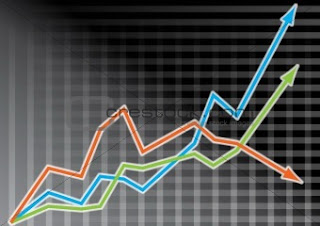Market Share
Sales figures do not necessarily indicate how a firm is performing relative to its competitors.
The firm's performance relative to competitors can be measured by the proportion of the market that the firm is able to capture This proportion is referred to as the firm's market share and is calculated as follows:Market Share = Firm's Sales / Total Market Sales
Sales may be determined on a value basis (sales price multiplied by volume) or on a unit basis (number of units shipped or number of customers served).
Reasons to Increase Market Share
· Economies of scale - higher volume can be instrumental in developing a cost advantage.
· Sales growth in a stagnant industry - when the industry is not growing, the firm still can grow its sales by increasing its market share.
· Reputation - market leaders have clout that they can use to their advantage.
· Increased bargaining power - a larger player has an advantage in negotiations with suppliers and channel members.
Ways to Increase Market Share
The market share of a product can be modeled as:
Share of Market = Share of Preference x Share of Voice x Share of Distribution
According to this model, there are three drivers of market share:
· Share of preference - can be increased through product, pricing, and promotional changes.
· Share of voice - the firm's proportion of total promotional expenditures in the market. Thus, share of voice can be increased by increasing advertising expenditures.
· Share of distribution - can be increased through more intensive distribution.
Reasons Not to Increase Market Share
An increase in market share is not always desirable. For example:
· If the firm is near its production capacity, an increase in market share might necessitate investment in additional capacity. If this capacity is underutilized, higher costs will result.
· Overall profits may decline if market share is gained by increasing promotional expenditures or by decreasing prices.
· A price war might be provoked if competitors attempt to regain their share by lowering prices.
· A small niche player may be tolerated if it captures only a small share of the market. If that share increases, a larger, more capable competitor may decide to enter the niche.
· Antitrust issues may arise if a firm dominates its market.
· Product - the product attributes can be changed to provide more value to the customer, for example, by improving product quality.
· Price - if the price elasticity of demand is elastic (that is, > 1), a decrease in price will increase sales revenue. This tactic may not succeed if competitors are willing and able to meet any price cuts.
· Distribution - add new distribution channels or increase the intensity of distribution in each channel.
· Promotion - increasing advertising expenditures can increase market share, unless competitors respond with similar increases.

No comments:
Post a Comment